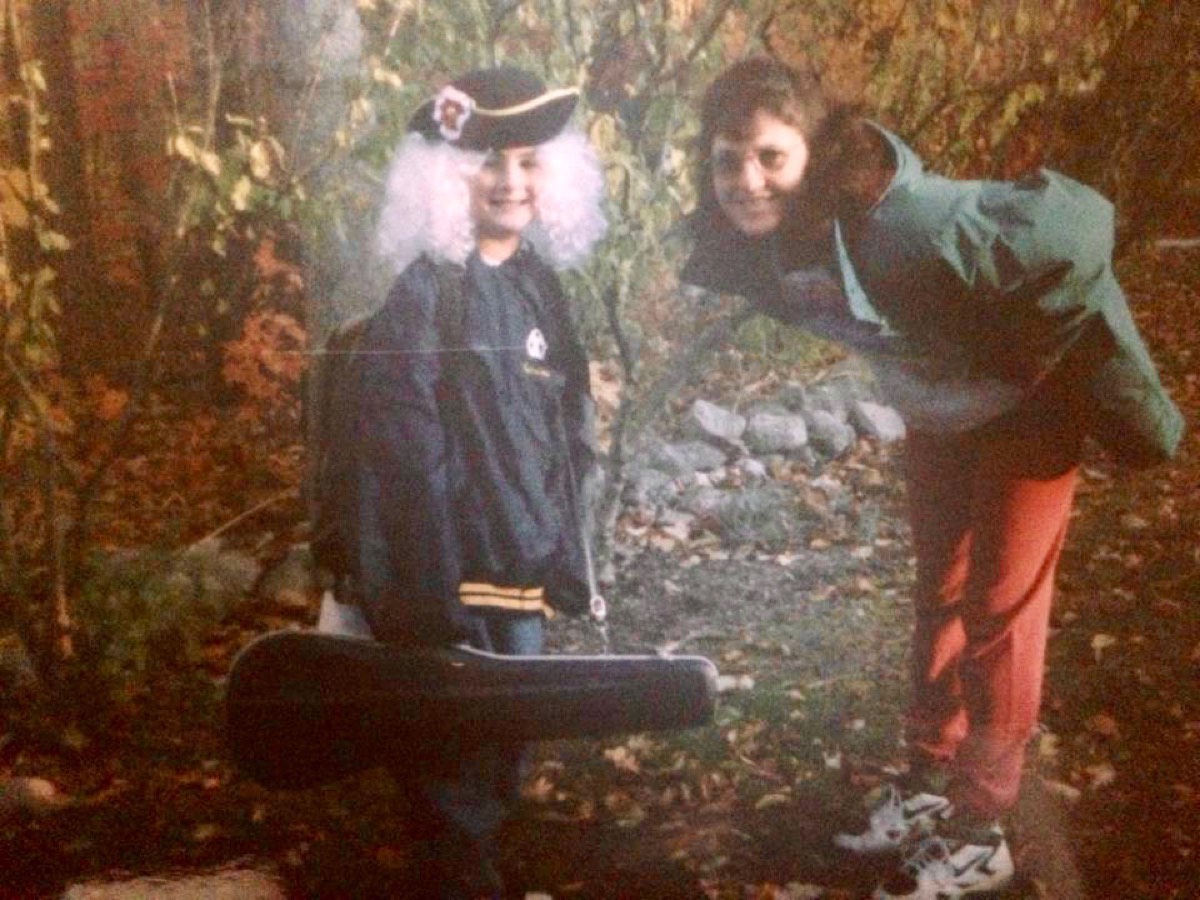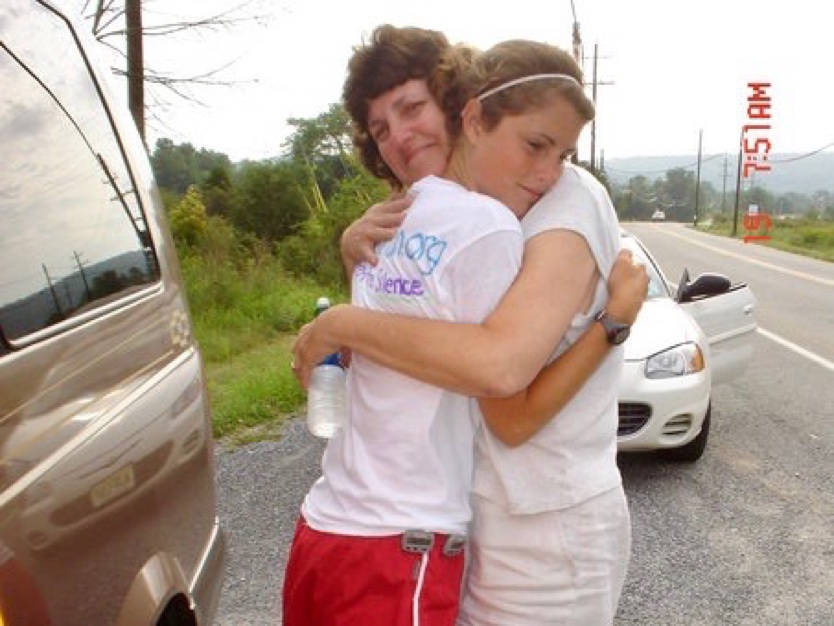It was a warm day in early summer, and I was home for the week. I picked my way across town to get to the Appalachian trailhead, a spot about eight miles from my home. Just as I arrived at the trail, my mom pulled up in her car, so I stopped my watch and greeted her. Then the two of us went for a hike together. We had been going on hikes since before I could walk, but things were definitely changing. In the past, she was the leader of the pack, always driving the pace from the front. My mom was an ebullient person—energetic, joyful, and talkative—and I would almost have to jog to keep up with her walking pace. Now she was still joyful but more subdued, and her pace was slower. We only hiked a couple of miles that day, and we stopped multiple times so she could catch her breath. It was the first time I really started to worry.
Summer ended. School began, and my mom’s cancer progressed. I spent my weekdays at Yale University, attending classes. On Fridays, I would drive the 3.5 hours home or to various hospitals so we could spend our weekends together, returning to school early on Monday mornings. I usually got a run in, and I often did my homework while sitting in her hospital room. I was present, but only sort of. I definitely kept busy. We talked about what it would be like when she would attend my graduation that spring, but she didn’t even make it to Thanksgiving.
From that time of my life, I regret all of the runs I took for which I could have been spending time with her. I regret the school work that prevented me from being fully present with her in those hospital rooms. And I regret that I drifted inward and kept my mind busy, failing to adequately stay.
Sloth
The formal name for sloth in the classical tradition is acedia—apathy or resistance to the demands of love. (1) If you are anything like me, you probably think this vice has nothing to do with you. Sloth is laziness or indolence. It is unproductive. Sloths (the animal) are metabolically sluggish and idle, and not at all like the runners I know. Honestly, I’m not tempted by these things. Just the idea of laziness makes me squirm.
But our contemporary imagination for sloth has shrunken by half. In fact, at its core, sloth is an inner resistance that has two opposing manifestations: the idleness I just described and busyness. Sloth is either undue rest on the one hand, or restlessness on the other. That is, instead of failing to adequately love because of laziness or idleness, my resistance can look like moving about at a frenetic pace or doing frivolous work. (2) Sloth can mean filling my life with diversions or distractions so that I fail to stay present or to do the right work, in the right way. This definitely describes me. It describes a lot of us in the Western world and has been variously called ‘the cult of busyness,’ ‘the busy trap’ (3), and (mistakenly) ‘industriousness.’
When I say ‘resistance to the demands of love,’ you can think about your love of running. Indeed, this is what I am going to address next. But I provided an image of my relationship with my mom because there are certain loves in our lives that are more important than our love of running, for which running might be the diversion that prevents us from being fully present and loving well. And in a lot of situations, we won’t have the opportunity to go back and fix that.
Stay
In a recent interview, I was asked what I tell myself when I feel bad during a run. The answer is, “Stay.” Any time things are difficult and I am not sure if I can continue, I tell myself that all I need to do is exactly what I am already doing. This is what perseverance is—to remain under a burden. Perseverance is firmness of purpose or steadfastness. In the case of a journey that is already begun, perseverance only asks that we keep doing what we are already doing. We have to stay.
In the running scenario above, I see myself as resisting two temptations—to stop or to divert myself with aimless, trivial thoughts. It would be easy to lie down on the sidewalk or to walk off the course—to resist the demands of my sport by surrendering the task. It would also be easy to mentally evacuate the scene. This is because when I fail to persevere, the temptations I face are actually the twin manifestations of sloth. For both types of acedia, if my workouts are lengthy or if they demand that I give my best, I won’t be well-positioned to stay.
In Glittering Vices: A New Look at the Seven Deadly Sins and Their Remedies, Rebecca Konyndyk DeYoung writes, “Acedia’s greatest temptations are escapism and despair… to abandon ship and give up, to drift away inwardly or outwardly toward something more comfortable or immediately comforting.” (4) Within a run, this might look like resisting the mental work of ‘staying’ and committing to the task, or it might look like quitting altogether.
Over an extended course of training, sloth can look like one of two things:
- I may fail to put in the necessary work needed to perform at my best, which will look like idleness or laziness. These are deficits natural to the typical conception of sloth. I am failing to love my sport by failing to show up at all and to put the work in.
- Or I may work frenetically. I might perform the wrong sorts of work, busying myself so that I fail to notice the difference. My busyness might be performance-relevant (as in, doing lots of superfluous activity or stacking on training without a logic to my methods) or performance-irrelevant (such as by spending too much time on unproductive diversions, like the internet or video games).
This second type of acedia (busyness) can manifest as a failure to sensibly rest. Rest is often compromised with frivolous work—second runs we don’t need, unproductive diversions, and short jogs ‘even though it’s my rest day.’ It might seem like these are good things—that we are checking every box twice and guarding against laziness—but this restlessness is not helpful to us. There is a perverse comfort in filling up our days with distractions to feel like we are doing work because we confuse busyness for diligence.
How Can We Fix This?
Interestingly, the treatment for sloth sounds a lot like running practice. The desert fathers, who were ascetic Christian hermits in Egypt and Mesopotamia from the third to the seventh centuries, spoke of stabilitas loci—the practice of staying in place. This is essentially perseverance—training our “physical frailty and fickleness of will” to stay. (5) Because our sport is one in which perseverance is the ultimate objective, runners are well-positioned to learn to better ‘stay in place.’ We train for this. The extent to which we can persevere is measurable—in miles or minutes—and hopefully these numbers increase over a training cycle. That said, you still might be unsure about what the demands of running are, or what meaningful work (rather than busyness or aimless activity) looks like. For guidance, it can help to have the vantage of a friend or a coach to teach you, to serve as an exemplar, or to keep you accountable to staying when things feel hard.
These suggestions are directed at combatting sloth within the domain of running, and we probably love other things, too. As I said, sometimes our love of running can detract from more important things. So, my suggestions are as follows:
Figure out what you love.
If running fast is at the top of your list, that’s fine. But you won’t be fast your whole life, so privileging running as your greatest occupation will probably lead to regrets in other areas of life. To be clear, I am not saying that running itself is frivolous. I love it, and it has been a great source of purpose in my life. However—if I am being honest with myself—at the end of the day, I am just a person who takes recess very seriously. Love of people should far outshine my love of sports.
You may love your city, your family, friends, the outdoors, and sport. Enumerate these loves and prioritize them so you can start asking yourself the right questions.
Figure out what love demands of you.
If you love a person, ask how you can build into that relationship and be deeply present, rather than fail to put in the necessary work (lazy-type sloth) or to be distracted and aimless (busy-type sloth). If you love your city or your country, then ask what being a committed citizen entails. Be reflective, and then act accordingly.
Stay.
Blaise Pascal writes, “I have often said that the sole cause of man’s unhappiness is that he does not know how to stay quietly in his room.” (6) Sometimes the best thing we can do is to be fully present where we are and to not be physically busy or internally busy, or to drift away. Stay in one place. I regret that I was not able to do that better with my mom, and I aim to not have similar regrets in the future.
Sloth is either undue rest on the one hand, or restlessness on the other. Both hinder our ability to love our sport and the people around us. But as athletes, we know what it means to persevere and can practice being fully present—to do the right work, in the right way.
Call for Comments (from Meghan)
- Are you challenged by the vice of sloth somewhere in your life? Are you willing to share a little about this?
- What areas of your life do you think could be improved by this idea of ‘staying’ and persevering through when things get difficult or uncomfortable?
References
(1) DeYoung, R.K. Glittering Vices. Grand Rapids: Brazos Press, 2009. pp. 79-80.
(2) DeYoung, R.K. (2007) “The Vice of Sloth: Some Historical Reflections on Laziness, Effort, and Resistance to the Demands of Love.” The Other Journal. Web. Accessed 7 February 2019.
(3) Kreider. T. “The ‘Busy’ Trap.” The New York Times. 30 June 2012.
(4) DeYoung, R.K. Glittering Vices. p. 97.
(5) DeYoung, R.K. Glittering Vices. p. 97.
(6) Pascal, B. Pensees. VIII. Diversion. 136.


